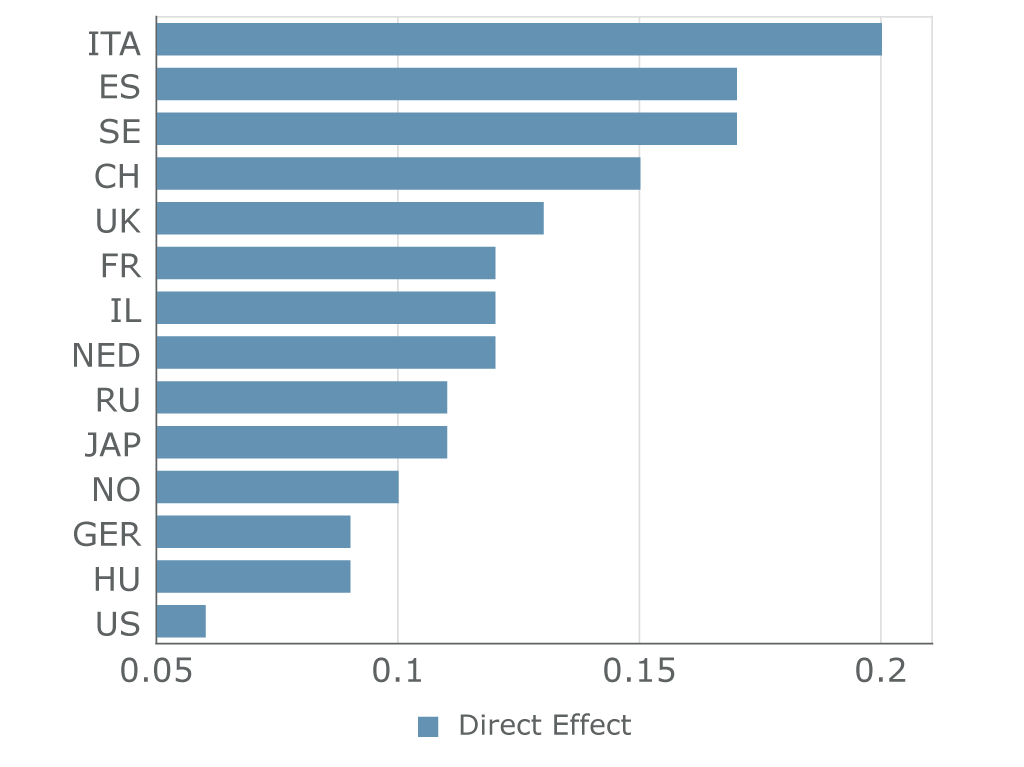by Fabrizio Bernardi and Gabriele Ballarino
Widespread education is, without a doubt, one of the great achievements of modern, industrialised states. In gross terms, it has pulled millions out of poverty over the last century. In relative terms, it has facilitated unprecedented socio-economic mobility and, presumably, equality.
Presumably.
In a recent book, we test whether education is in fact the great equaliser in 14 countries: France, Germany, Hungary, Israel, Italy, Japan, the Netherlands, Norway, Russia, Spain, Sweden, the United Kingdom, and the United States. Along with several distinguished co-authors, we analyse the intergenerational transmission of socio-economic inequality among individuals who have achieved the same level of education.
The upshot: in all of these countries we found a substantial direct effect of social origin, or DESO, on occupational outcomes. That is, where you start goes quite a way in determining where you end up, and it always has.
Figure 1 shows the DESO in terms of the International Socio-Economic Index (ISEI), which measures occupations on a scale of 16 (lowest) to 90 (highest). The numbers represent the effect of one-unit changes in parental ISEI scores on an individual’s score, controlling for education (measured using the most detailed classification available in each country) and a set of other key variables like age and gender.

Figure 1: The direct effect of social origin (parental ISEI) on respondent’s ISEI, controlling for education.
Source: Bernardi and Ballarino (2016).
There were some limitations imposed by measurement differences in different countries, but they did not stop a clear picture from forming, with all of the countries falling within a convincing range, between .10 and .15. At .20, Italy stood out at the top, while in the US the effect was weakest at .06.
Back on the ISEI, this means that a 65-point variation on parents’ score is associated, on average, with a 6- to 10-point change in an individual’s. This is not a trivial gap. Ten points are what separate a university professor from a high school teacher, or a taxi driver from a window cleaner. It is also considerably larger than the race and gender penalties incurred by, for instance, African Americans in the US (4 points) or women in Spain or Norway (2 points).
How it’s always been
We also find that, in almost all of the countries studied, the direct effect of social origin does not decrease over time, whether across cohorts or periods. In 9 of the 13 countries for which analysis over time was possible, the intergenerational occupational association was stable, albeit with fluctuations, while in two countries (Israel and France) it actually increased. Only in two countries, the Netherlands and Sweden, did we find evidence of some decline in DESO on ISEI scores, but the trends were not robust for all model specifications.
In other words, despite expanding education, the effect or your parents’ social standing has continued to play an important role in determining your own—calling into question the role of education as “the great equaliser”.
For policymakers the message is clear. Education is an important tool for improving the health, resilience and mobility of citizens. Alone, however, it cannot correct widening socio-economic inequalities, and should not be expected to. That will, almost certainly, take far more political daring.
About the authors:
Gabriele Ballarino, Professor of Economic Sociology at the Università degli Studi di Milano/Italy.
Fabrizio Bernardi, Professor of Sociology and Head of the Department of Political and Social Sciences, European University Institute/Italy.
Bernardi, F. & G. Ballarino (Eds.) (2016): Education, Occupation and Social Origin. A Comparative Analysis of the Transmission of Socio-Economic Inequalities. Cheltenham: Edward Elgar.